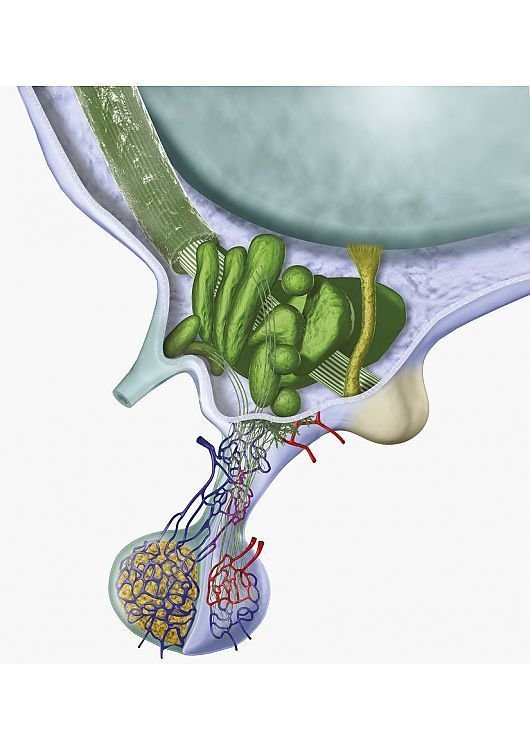- January 17, 2025
- By drzaarofficial1@gmail.com
- 18
The Multifunctional Peptide Hormone
Understanding Pituitary Adenylate Cyclase-Activating Peptide (PACAP) and Its Functions
Pituitary adenylate cyclase-activating peptide (PACAP) is a neuropeptide that plays an important role in various physiological processes, including the regulation of neurotransmission, cell signaling, and vasodilation. PACAP is produced in the pituitary gland and other tissues, including the brain and peripheral nervous system. It functions by activating adenylate cyclase, an enzyme that increases the levels of cyclic AMP (cAMP) within cells, leading to a cascade of signaling events that regulate a wide range of biological processes.
PACAP has been implicated in regulating mood, stress responses, and circadian rhythms. It also influences the cardiovascular system by promoting vasodilation and regulating blood pressure. Moreover, PACAP is involved in brain function, influencing neuroplasticity, learning, and memory. Its role in protecting neurons from stress-induced damage has made it a potential target for therapeutic interventions in neurodegenerative diseases.
Key Functions of PACAP
- Neurotransmission and Brain Function: PACAP plays a crucial role in neurotransmitter release, neuroplasticity, and cognitive processes like learning and memory.
- Cardiovascular Regulation: PACAP promotes vasodilation, helping to regulate blood pressure and improve circulation.
- Stress Response and Mood Regulation: PACAP is involved in the regulation of stress hormones and mood disorders, potentially influencing anxiety and depression.
- Cell Protection: PACAP has neuroprotective effects, protecting cells from damage and promoting tissue repair in response to stress.
The Role of PACAP in Health and Disease
PACAP’s diverse roles in the brain, cardiovascular system, and other tissues make it an essential hormone for overall health. PACAP dysfunction has been linked to several neurological and cardiovascular diseases. In neurodegenerative diseases like Alzheimer's and Parkinson's, PACAP's protective role may help reduce neuronal damage and promote recovery. Imbalances in PACAP signaling have also been associated with mood disorders, anxiety, and stress-related conditions. On the cardiovascular front, abnormal PACAP levels can contribute to hypertension or vascular diseases due to its effect on blood vessel dilation. PACAP is a promising target for therapeutic development, particularly in managing conditions related to the brain and cardiovascular system. Research continues to explore how manipulating PACAP signaling could offer new treatments for neurodegenerative diseases, stress-related disorders, and cardiovascular conditions. Disorders Linked to PACAP Imbalance PACAP dysregulation is linked to various conditions, including neurodegenerative diseases, anxiety, depression, and cardiovascular disorders. Reduced PACAP levels can impair neuroplasticity and cognitive function, contributing to conditions like Alzheimer's and Parkinson's disease. On the other hand, excessive PACAP production can lead to cardiovascular issues, such as hypertension, due to its vasodilatory effects. PACAP is also being studied for its potential role in managing stress-related conditions and mood disorders, as its regulation affects neurotransmitter release and stress response pathways.
Contact Us
+92-321-9700-700
FAQs About Pituitary Adenylate Cyclase-Activating Peptide (PACAP)
1. What is Pituitary Adenylate Cyclase-Activating Peptide (PACAP)?
PACAP is a neuropeptide hormone that activates adenylate cyclase, leading to increased levels of cyclic AMP (cAMP) and influencing a wide range of physiological functions, including brain activity, cardiovascular health, and stress responses.
2. How does PACAP affect the brain?
PACAP regulates neurotransmitter release, neuroplasticity, and cognitive functions such as learning and memory. It also has neuroprotective effects, helping to protect neurons from stress-induced damage.
3. What role does PACAP play in the cardiovascular system?
PACAP promotes vasodilation, helping to regulate blood pressure and enhance circulation. It is involved in maintaining cardiovascular health by supporting proper blood flow and vessel function.
4. How is PACAP involved in mood regulation?
PACAP plays a role in the regulation of stress hormones, and imbalances in PACAP signaling have been linked to mood disorders such as anxiety and depression.
5. Can PACAP be used to treat neurodegenerative diseases?
PACAP has protective effects on neurons, which makes it a promising target for developing therapies for neurodegenerative diseases like Alzheimer’s and Parkinson’s. By modulating PACAP levels, it may be possible to reduce neuronal damage and promote recovery.
6. What happens when PACAP levels are too high or too low?
Low PACAP levels can impair cognitive function, increase susceptibility to neurodegenerative diseases, and contribute to mood disorders. High PACAP levels can lead to cardiovascular issues like hypertension due to excessive vasodilation.
7. How is PACAP tested?
PACAP levels are typically measured through blood or cerebrospinal fluid tests, though it is primarily used in research settings to study its role in neurological and cardiovascular health.
8. Can PACAP be used to treat anxiety and depression?
Research suggests that PACAP may influence mood and stress responses. By modulating PACAP signaling, it may be possible to develop treatments for anxiety and depression by improving neurotransmitter regulation and stress response.
9. Is PACAP related to other hormones?
Yes, PACAP works in conjunction with other hormones, including cortisol (the stress hormone), to regulate stress responses and mood. It also interacts with growth hormones and other neuropeptides in the brain.
10. Can PACAP help with neuroprotection?
Yes, PACAP has neuroprotective effects, which means it can protect neurons from stress-induced damage and promote neuronal survival and repair. This makes PACAP a target for research in treating neurodegenerative diseases.
